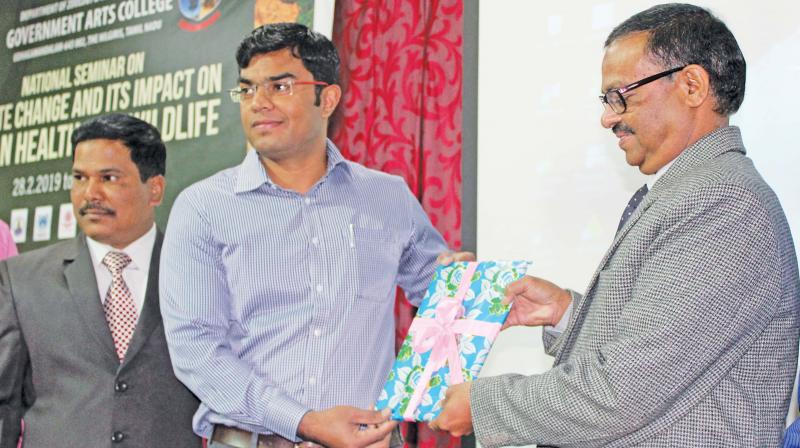Too many satellites add to global warming
Experts discuss climate change crisis in Ooty.

Ooty: While National Science Day commemoration on Thursday began with the inauguration of two-day national seminar on climate change and its impact on human health and wildlife, organised by the department of Zoology and Wildlife Biology(DZWB) at the Government Arts College(GAC) here, experts in the field are struggling to find sol tions.
Sumesh Soman, district forest officer (DFO) of Nilgiris, who inaugurated the event, said that unscrupulous discharge of pollutants over the years has vitiated the environment and now people are searching for complicated solutions to tackle the issue. “While nature has its own way of corrective mechanism, it takes time. To sustain a healthy environment, an attitude change and life style change is needed to live in harmony with nature to minimize the human impact on
environment,” he advised.
Dr P. Kannan, assistant professor at DZWB at GAC, the organising secretary of the seminar, who is an expert in herpetology, said that climate change is one of the greatest challenges faced by humankind and wildlife across the globe. With the current rate of green house gas emission, global temperature is found to be ever increasing. .
This increase in temperature has affected the climate pattern causing cascading effect on biotic and abiotic components of the earth.
“India is a known bio-diversity hot spot and occupied an important bio-geographic location in the world and represents high diversity of life forms. Over the years, various climate induced effects have been felt in India. Climate change is no more an environmental concern. It has emerged as the biggest challenge for development in the planet,” he pointed out.
Higher global temperatures will also enable vectors to move into areas that were previously too cold for them to survive. Ailments like cholera, dengue, yellow fever, malaria are likely to become more rampant. Heat waves will affect the vulnerable sections of the population, especially, children and the elderly. Outbreaks of diarrhea, cholera and other infectious diseases have been on the rise following climate-related factors such as occurrence of floods.
Mosquito-borne diseases such as malaria, dengue and chikungunya are on rise in India. There is an urgent need to find ways to manage this climate change issue,” Dr Kannan elaborated.
Dr M. Easwaramurthy, principal of the GAC, in his presidential address stressed upon adhering to the balancing act to sustain environment and development. He appealed for developing eco-friendly transport modes to check pollution from automobile exhausts.
Dr J.Ebanasar, head of the DZWB at GAC, expressed concern over micro-radiation pollution in space from the satellites and its possible impact on global warming.
A simple change in nature’s cycle will have big impact on all living organisms in earth, he noted.

